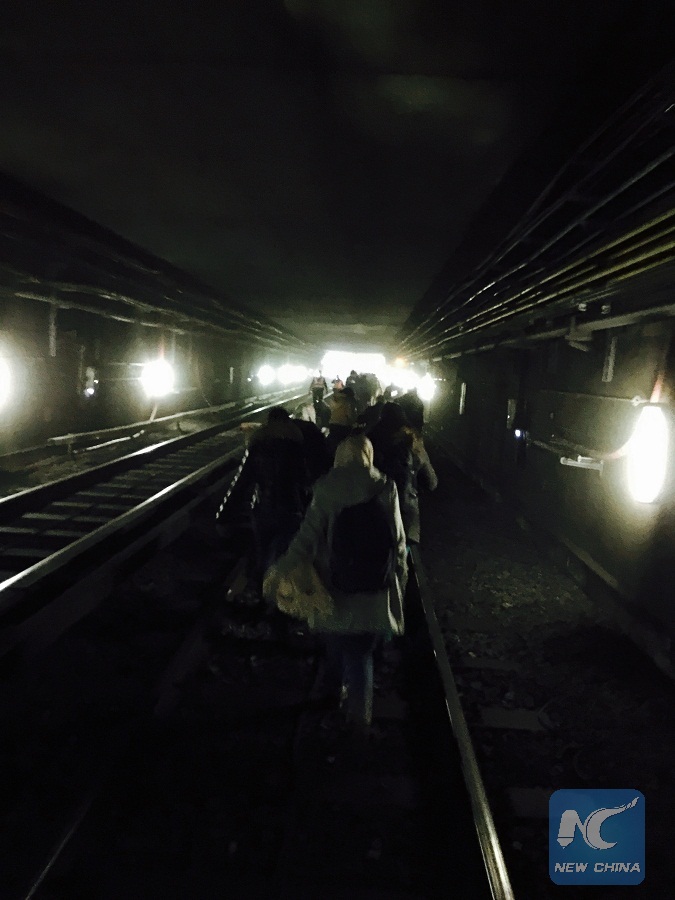
Passengers are evacuated to safe zone at the Maalbeek railway station in Brussels, Belgium, on March 22, 2016. (Xinhua/Han Shuang)
by Xinhua writers Huang Yong, Zhai Wei, Tian Dongdong
BRUSSELS, Sept. 12 (Xinhua) -- Known as the Heart of Europe, Brussels easily captures the heart of newcomers with its thousands of hectares of green spaces and neoclassical style buildings.
But heavily armed soldiers patrolling parks, stations and tourist resorts immediately bring them back to reality -- this city, which has been attacked twice this year, is under the threat of terrorism.
What happens in Brussels is just an epitome of whole Europe. Like a ghost, the threat of terrorist attacks is haunting Europeans incessantly. Plagued by the threat, Europe is rapidly drifting away from a land of tranquility.
THREE NEW TRENDS OF TERRORIST ATTACKS IN EUROPE
Despite the counter-terrorism measures taken by European governments and the European Union (EU), the number and frequency of terrorist attacks are increasing steadily.
As of the end of August, the whole continent witnessed at least 13 terrorist attacks, leaving at least 58 people killed and over 300 injured in Belgium, Britain, Finland, France, Germany, Spain and Sweden, among others.
"They (terrorists) aren't looking for spectacular results using huge resources, but rather they want frequency to try to destabilize their adversaries," Frederic Gallois, former head of France's elite GIGN anti-terror unit, told local media after the twin terrorist attacks in Barcelona. "It's the regularity which is the problem."
"At the moment, there's an attack every four to six weeks in Europe," he added. Then after each lull, "everyone says to themselves 'something's going to happen'."
Unlike sophisticatedly organized attacks such as "9/11," today's terrorist activities are intertwined with "lone wolf" style attacks and organized ones. In addition, suspects of attacks in Barcelona and Finland were ordinary people who had no criminal records before, making police investigations after the attack more difficult. And the use of social media as well as daily tools when committing crimes also makes the attacks harder to be detected and prevented.
Meanwhile, many suspects of terrorist attacks in Europe are descendants of native immigrants. For a long time, European countries turned a blind eye to the fact that their citizens were inspired by extremism and joined "Jihad" in the Middle East and other war-torn areas.
As terrorist groups like the Islamic State are being hit hard in the Middle East, they returned to Europe as legal residents. Europol estimates those people number over 5,000 and takes them as a serious concern.
VICIOUS CIRCLE OF VIOLENCE AGAINST VIOLENCE
The environment that nurtures extremism is not only linked with the social and economic problems in Europe, but also fueled by the international situation, late French philosopher Ruwen Ogien told Xinhua in 2015.
For one thing, the increased terrorist attacks in Europe have much to do with the intervention policies of European countries in the Middle East. Fighting for resources and markets, European countries have long been trying to establish their own sphere of influence there.
However, the one-sided competition in the region and egocentric policy of European countries not only disturbed local economic development, but also hindered Arabian industrialization, resulting in more poverty and inequality, a hotbed of terrorism.
Pursuing double standards, Western countries have long been taking anti-terrorism as a tool to implement their "Middle East policy." Instead of eliminating terrorism, Western powers had created soil for the survival of terrorism in the Middle East, leading Europe into a vicious circle of violence against violence, said Shen Yihuai, an expert on European affairs at China's Institute of Modern International Relations.
For another, due to Europe's economic downturn and high unemployment in recent years, the long-existing problem of immigrants' integration into the European society has deteriorated.
British economist and writer Martin Wolf said the 2008 financial crisis has adversely affected those unskilled and semi-skilled male workers in the West, who were once significant beneficiaries of industrialization.
Wolf, an associate editor and chief economic commentator of the London-based daily Financial Times, believes that the rising role of the financial sector, the increasing imports of labor-intensive goods and the surging immigration are behind the Western public anger.
Thirdly, the inherent paradox of the Western democracy results in the insufficient protection of the interests of the marginalized groups. Frequent terrorist attacks cannot only be attributed to cultural and religious conflicts between the West and the Middle East. The Western social system ridden with internal conflicts and contradictions should also be blamed, said Ogien.
In addition, the mainstream Christian culture in European countries still distorts and repels Muslim culture, consequently intensifying the trend of conservatism in the European society.
European countries should reflect on their internal and external policies and make timely adjustments, which are the key to long-term stability on the continent, said Cui Hongjian, director of the China Institute of International Studies.

